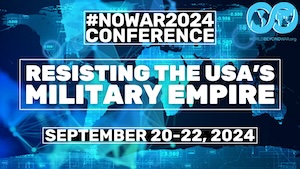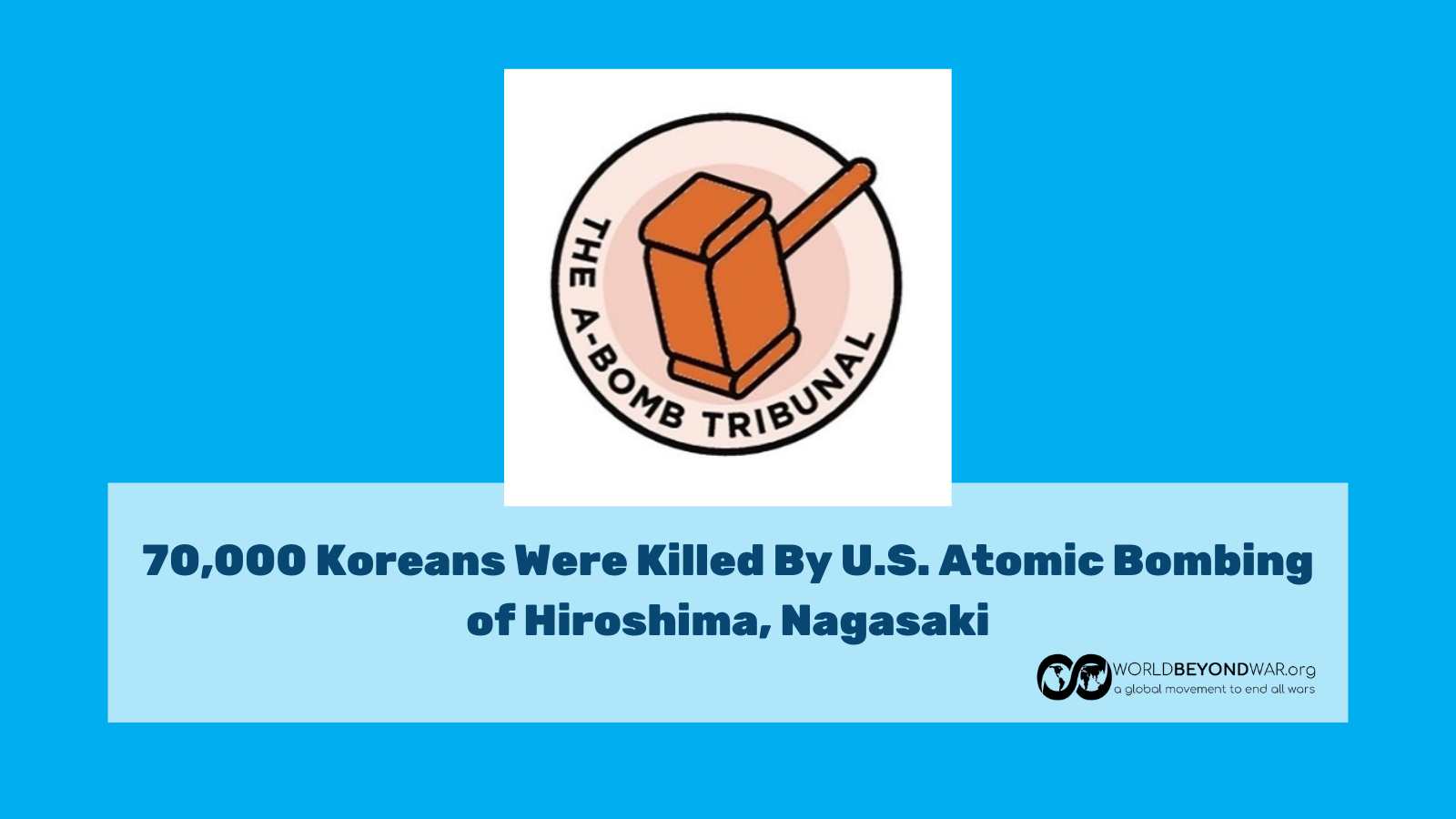By The International People’s Tribunal on the Responsibility of the U.S.A. for the 1945 Atomic Bombings and for Ensuring Redress (Apology) to the Korean Victims, August 6, 2024
Legal Team and Legal Mandate Established for Tribunal Investigation Into 1945 Atomic Bombings of Hiroshima and Nagasaki Which Claimed 70,000 Korean Victims
On August 6, 2024, The International People’s Tribunal on the Responsibility of the U.S.A. for the 1945 Atomic Bombings and for Ensuring Redress to the Korean Victims announced the members of the Legal Review Team which will be leading a Tribunal seeking the following:
- A legal decision as to whether the 1945 atomic bombings by the U.S. violated international law.
- A legal decision that the current threat to use and the use of nuclear weapons are in violation of international law.
- An official apology from the U.S. to the Korean victims for the atomic bombings of 1945.
During the 1930s, approximately 1.2 million Koreans were forcibly removed by the Japanese from their homeland, and many were brought to the cities of Hiroshima and Nagasaki to work for the Japanese. The U.S. knowingly dropped the world’s first atomic bombs on these two civilian cities on August 6 and August 9, 1945, claiming over 700,000 victims in total, 70,000 of whom were Korean nationals.
This International People’s Tribunal has established a powerful legal team with law professors and trial attorneys from around the world to present the evidence, argue the law, and hold the relevant parties accountable. A panel of international judges will deliberate on the evidence and render a verdict.
Presenting this evidence and establishing these precedent-setting legal rulings will have a positive influence on the Denuclearization of the Korean Peninsula and the bringing of a lasting peace to that area and to a world without nuclear weapons.
The Tribunal Legal Team consists of the following members:
- Daniel Rietiker, Adjunct Professor of International Law and Human Rights at Lausanne University, Switzerland; Co-President of IALANA
- Toshinori Yamada, Professor at Meiji University Law School, Japan
- Okubo Kenichi, President of Japan Association of Lawyers Against Nuclear Arms, Japan
- Manfred Mohr, Professor of International Law and Co-chair of International Coalition to Ban Uranium Weapons, Germany
- Monique Cormier, Senior Lecturer at the Faculty of Law, Monash University, Australia
- Anna Hood, Associate Professor of the Auckland Faculty of Law, New Zealand
- John Kierulf, Former Diplomat of the Denmark Ministry of Foreign Affairs
The Tribunal also announced that the official Co-Chairs of the International People’s Tribunal are the Honorable Former Bishop Kang Uil (Peter) from the Catholic Diocese of Jeju; and the former Mayor of Hiroshima, the Honorable Hiraoka Takashi. Both individuals were in attendance in June 2024 in Hiroshima during the second forum to establish the Tribunal. Their long work in this field, their legacy and voice, provide a deep moral authority to the Tribunal.
The Tribunal will spend the next two years assembling evidence, witness testimony, and forming its legal arguments. The Tribunal will hold its oral proceedings in New York City in 2026, a year which will mark the convening of the Review Conference of the Treaty on the Non-Proliferation of Nuclear Weapons and the Review Conference of the Treaty on the Prohibition of Nuclear Weapons.
SPARK (Solidarity for Peace and Reunification of Korea), a peace NGO based in South Korea, and Brad Wolf, lawyer and former prosecutor serve as co-coordinators.
The following organizations have endorsed this Tribunal and are serving as partner organizations: Environmentalists Against War, World BEYOND War, Peace Action, International Association of Lawyers Against Nuclear Arms, International Peace Bureau, International Fellowship of Reconciliation, Japan Association of Lawyers Against Nuclear Arms, Japan Council Against Atomic and Hydrogen Bombs, Korean American Peace Fund, Merchants of Death War Crimes Tribunal, Peace Action New York State, STOP the War Coalition Philippines, The International League of Peoples’ Struggle, Veterans for Peace, The United Methodist Church,
Legal Review Paper
The present backgrounder aims at informing the public about the creation of the International People’s Tribunal (IPT) with the mandate to decide whether the U.S.A. bears responsibility for the atomic bombings of the towns of Hiroshima and Nagasaki in August 1945 and has to ensure appropriate satisfaction for the Korean victims. The victims are of the opinion that the most appropriate redress consists of a formal apology.
I. Background of the IPT
It is estimated that around 70,000 to 100,000 Koreans fell victim to the atomic bombings of Hiroshima and Nagasaki by the United States on August 6 and 9, 1945. These Korean atomic bomb victims were sacrificed by two major historical tragedies of the 20th century, bearing the “cross of the nuclear age”: forced mobilization under Japanese occupation and the United States’ nuclear bombings. From the very beginning, Korean atomic bomb victims have demanded accountability from the United States and sought justice and reparation. However, their voices have been suppressed and marginalized due to the Cold War confrontation, nuclear alliance, and prevailing anti- communism in Korean society.
In 2015, victims’ voices demanding accountability from the United States gained new momentum at the Review Conference of the Treaty on the Non-Proliferation of Nuclear Weapons (NPT), driven by the appeals of Mr. Jin-tae Sim and Mr. Bong-dae Kim (father of a 2nd generation victim, Hyung-ryul Kim). They were the first to bring the suffering of Korean atomic bomb victims to the UN, calling for the recognition of the United States’ responsibility, investigation, apology, and reparation. They also reviewed the possibility to bring a lawsuit in the United States to provide remedies for victims but faced overwhelming legal barriers. Consequently, Korean atomic bomb victims and supporters decided to condemn the illegality of the US atomic bombings of Hiroshima and Nagasaki in 1945 through an international people’s tribunal, thereby laying a foundation to bring a lawsuit in the United States in a future.
The voices of Korean atomic bomb victims insisting “the atomic bombings of Hiroshima and Nagasaki were wrong, and we demand an apology” remain unbroken. They emphasize their life-long devotion to winning an acknowledgment of responsibility and an apology from the United States. We must all take their plea seriously, and we have a shared responsibility of all who yearn for the realization of the reunification of the Korean Peninsula and a world free from nuclear confrontations.
In view of preparing the launch of the IPT, two International Forums have been held in South Korea (June 2023) and Hiroshima (June 2024). The 1st forum analyzed the legality of the US atomic bombings of Hiroshima and Nagasaki under conventional and customary international law as of 1945. The 2nd Forum discussed the legality of the use of nuclear weapons and extended deterrence by nuclear-weapon states under current international law, in particular under international humanitarian law (IHL). A third Forum (online) is planned for March 2025.
II. Mandate of the IPT
The IPT pursues the three following main goals:
The primary purpose of the IPT is to assess the legality of the bombings of Hiroshima and Nagasaki by the United States in 1945, establish the legal basis for holding the United States internationally responsible, and obtain from the United States an apology and redress to the victims. This recognition of the United States’ responsibility is essential in alleviating the suffering of the Korean Atomic Bomb Victims and restoring justice and human rights that had been infringed.
The second purpose of the IPT consists of reinforcing the illegality of nuclear weapons and the prohibition of their threat and use: The 1996 Advisory Opinion of the International Court of Justice (ICJ) on the Legality of the Threat or Use of Nuclear Weapons may leave room to argue that the threat or use is legal in exceptional circumstances of self-defense, and the Treaty on the Prohibition of Nuclear Weapons (TPNW) has, until now, limited effect due to the non-ratification of nuclear-armed states. Against this backdrop, the IPT will play a significant role in promoting an international customary norm against any threat and use of nuclear weapons in the present and future.
Achieving Peace on the Korean Peninsula and Dispelling the Nuclear Myth will be the third purpose: In the Korean Peninsula, where Cold War confrontation, nuclear alliance, and the myth of nuclear weapons prevail, the IPT will have practical implications. By countering the distorted claims of certain political leaders who justify the status quo, the Tribunal will provide a means for genuine peace and contribute to a world and Korean Peninsula free from nuclear confrontations.
III. Date and venue of the IPT: 2026, New York
Date: 2026 will be a significant year. It marks the convening of the 11th Review Conference of the NPT and the First Review Conference of the Treaty on the Prohibition of Nuclear Weapons (TPNW). Holding the Tribunal during this period would amplify its meaning and symbolic significance.
Venue: New York, Vicinity of the UN Headquarters
New York is a major US city bearing responsibility for the 1945 atomic bombings and houses the United Nations Headquarters. Moreover, it holds symbolic importance as the city is associated with the ‘Manhattan Project,’ the nuclear weapons development program directly linked to nuclear weapons.
IV. Parties to the proceedings
Claimants (Plaintiffs): Korean atomic bomb victims.
Defendant: The United States of America (USA)
Third parties (amicus curiae):
International experts, civil society, victims of nuclear testing and of accidents of nuclear power plants and other nuclear victims, as well as other persons concerned will be able to request to intervene as third parties. The IPT will define the conditions for the acceptance and modalities for the exercise of this right.
V. Compositions and structure of the IPT
The IPT will be composed of 5 Judges from different regions, backgrounds and gender. They will sit in their individual capacity and be independent and impartial.
The IPT will decide unanimously or majority vote. The judges of the minority can attach dissenting opinions.
The IPT shall have a Secretariat, the functions and organization of which shall be laid down by in its Statute and Rules of Procedure.
VI. Applicable law
The IPT shall decide the case based on conventional and customary international law as of 1945, particularly international humanitarian law, including the 1868 St. Petersburg Declaration, the 4th 1907 Hague Convention respecting the Laws and Customs of War on Land and its annex (Regulation concerning the Laws and Customs of War on Land). It shall also be guided by general principles governing the responsibility of States for internationally wrongful acts.
VII. Procedure
Fair trial guarantees:
The procedure before the IPT shall be transparent and respect basic principles of fair trial and equality of the parties.
Statute and Rules of procedure:
The IPT will establish its own Statute and Rules of Procedure, taking direction and inspiration, inter alia, from the Statute of the International Court of Justice (ICJ) and relevant human rights courts.
Three phases:
The procedure will comprise the following three phases:
Submission and exchange of written observations
The plaintiffs and the respondents will be given a certain time frame in order to file written memorials on the facts, the admissibility and merits of the case. In order to guarantee the adversary nature of the procedure, these memorials will be exchanged between the parties for additional comments. If necessary, the IPT can ask specific questions in order to direct the parties in their written submissions.
The parties will also have the opportunity to duly respond to the third party observations.
The written phase, including the submission of third-party interventions, shall tentatively be close by December 2025 (to be confirmed).
Public oral hearing
Oral pleadings, based on the written observations, are tentatively scheduled in New York for June 2026 (to be confirmed) and last between one and three days. A major part of the time shall be devoted to the statements of the victims and expert witnesses. The parties to the proceedings can propose witnesses to the IPT. The Tribunal can also hear witnesses of its own motion. It may also hear statements from witnesses video-recorded in advance.
Third party intervenors, upon request, may also be given the opportunity to participate in the oral hearing, in order to emphasize certain arguments contained in their written submissions. The IPT will determine the conditions and modalities for an oral intervention of third parties in its Statute and Rules of Procedure.
Delivery of the Judgment
The IPT will deliver the judgement in a public oral hearing. The delivery is provisionally scheduled for the week preceding the opening of the 11th NPT Review Conference (New York). The judgment shall be submitted to the Conference as well as to the U.S. Government.










